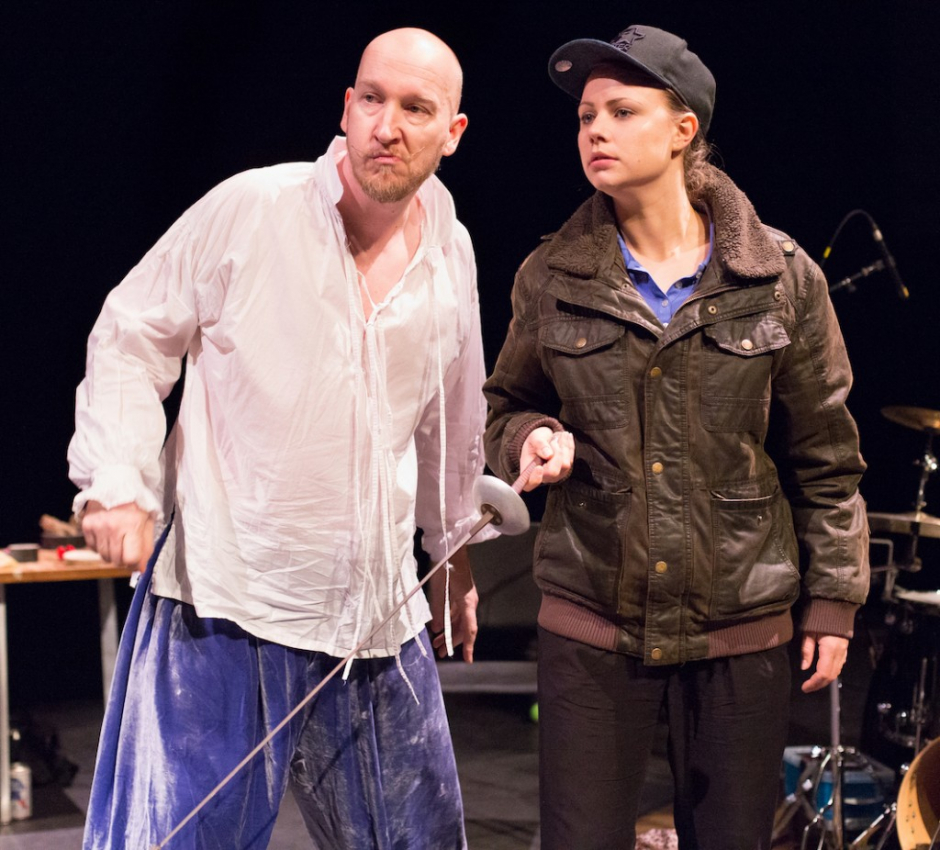Twelfth Night, HOME; May 11 2016
There are a few ways to do Shakespeare. Fans of the bard will be familiar with a fair few of them. From the standard stick to the script and stick the actors in clothes that look a bit like those they wore in the 1500s, to the modernise the clothes and the set but keep the words as they were, via the adaptation of a Shakespearean work to a modern setting and use of a lingo more familiar to this generation than those that came before. All of these have their merits, and all have had their successes and failures. There can’t have been many adaptations, though, that have turned Shakespeare into a kind of jazz/rock and roll party with added pizza, sticky Velcro hats, Walkers crisps, debates over the biscuity status of Jaffa Cakes, and audience members up on stage doing tequila shots with the cast.
But this is exactly what Filter Theatre have done with Twelfth Night. In fact, that isn’t even where the oddities begin and end. Seeing the cast members walking around the stage before the play had even begun, chatting to each other like they would were the audience’s eyes not upon them, was already a little disorientating. When they began the first act by not only breaking the fourth wall, but also encouraging a loud and energetic brand of audience participation, it was clear that this was Shakespeare with a pretty big twist.
Twelfth Night is, of course, one of Shakespeare’s ‘comedies’. And while the genre of comedy would nowadays imply you were in for at least a few laughs, the word had a slightly different meaning back then. Comedies often leant upon disguise and trickery, and figures such as the oft-appearing tragi-comic fool. There were certainly meant to be laughable and farcical elements, but the aim wasn’t to draw out the belly laughs like a new comedy must in the modern age. This has often led to ‘comic’ adaptations of the plays feeling a little awkward and forced, caught between the two definitions of the word.
Filter Theatre’s Twelfth Night, however, managed to hit that sweet spot between the two. By underplaying the disguise and gender swapping elements of the story, and actually emphasising the ridiculousness of it all, they presented a play that had the audience is stitches from the start to the end. Whether laughing at Malvolio’s (Ferdy Roberts) awkward and almost disturbing striptease, giggling along as main players broke character and sat among the crowd, or finding it difficult to control the hysterics during the incredible rendition of O Mistress Mine (the highlight of the play), the full house was relishing the mix of sophistication and silliness that make the show such a success.
The cast have to take a huge amount of credit for that. It must be difficult job to walk that line between acting a part and interacting with audience members to the level that they do, and Crystal Condie (Feste/Maria), Amy Marchant (Viola/Sebastian), and Harry Jardine (Orsino/Aguecheek) deserve particular props for their work in this department. It would be unfair to praise them for this, though, without offering similar to Dan Poole (Sir Toby Belch) and Ferdy Roberts for their fantastically funny performances. Olivia Darnley is also superb as the sensual and persistent Olivia. And all of that has been said without even mentioning the majestic musicians, of which Laura Moody shone particularly brightly.
There were a lot of risks inherent in adapting the play along these lines, but at no point did they fall short of the mark. Not many plays produce such a raucous and excited reaction from their audience and Filter Theatre deserve an awful lot of admiration for extracting that reaction in a way that made Shakespeare seem fresh, young, and exciting.
Fran Slater

